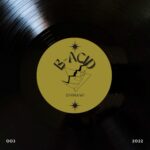Helen Yee’s long-awaited debut solo album, Orchestrope, is a stunning sonic journey that merges the atmospheric qualities of ambient music with the introspective calm of New Age. Known for her rich history as a performer in New York City’s indie rock and alt-chamber scenes, Yee brings a fresh approach to instrumental music, blending electronic soundscapes with classical string arrangements. The result is an album that feels both expansive and deeply personal, evoking a cinematic experience for the listener.
The title track, “Orchestrope,” immediately sets the tone for the album with its atmospheric drones and dynamic use of rhythm. Opening with a haunting percussive string texture, the piece gradually builds into a vast, orchestral sound that gallops through an imaginative landscape. The rhythmic pulse is subtle but steady, using organic and electronic layers to create a captivating forward momentum. The bassline here is sparse but effective, grounding the piece in moments of tension before allowing it to lift off into more ethereal territory.
One of the standout aspects of Orchestrope is Yee’s mastery of texture and atmosphere. In “Noche de Julia,” she explores melancholic melodicism with a sensitivity honed from her classical training. The synths create a moody, almost dreamlike soundscape, with the violin floating delicately over them. This track, originally composed for a bilingual theatre work, carries an emotional depth that resonates long after it ends. The combination of her lush string arrangements with electronic elements provides a fresh, immersive experience, allowing the listener to sink into the emotional narrative of the music.
Tracks like “Ferromagnetica” highlight Yee’s experimental side. Inspired by her electronic sound design work, this piece ventures into grittier, more complex territory with its odd time signatures and darker timbral palette. The rhythms here are unpredictable, creating a sense of unease and curiosity. This track showcases Yee’s ability to push boundaries, fusing the edge of indie rock with the intricate layers of ambient soundscapes. The synth lines swirl and weave through the mix, adding a haunting, otherworldly quality, while the sweeping double-stop violin lines cut through with precision.
On the more serene end of the spectrum, tracks such as “The Square Root of Paradise” and “Tanoura” draw from visual art inspirations, offering a peaceful and reflective mood. Here, Yee slows down the pace, allowing the music to breathe and develop more slowly. The use of looping creates hypnotic patterns, where subtle rhythmic shifts guide the listener through tranquil and meditative states. The basslines in these tracks are understated but essential, providing warmth and depth to the otherwise airy compositions.
“Sprung” stands as a symbol of Yee’s personal transformation, a composition born out of her departure from New York City. It’s both tentative and exuberant, reflecting the feelings of uncertainty and renewal. The rhythmic interplay between strings and electronics is particularly striking here, as it ebbs and flows with an organic grace. The live-looping technique becomes a core part of the composition, providing a sense of immediacy and connection to her live performance roots.
Orchestrope is a beautiful convergence of Helen Yee’s influences—from classical music to indie rock, electronic experimentation, and improvisation. Her use of rhythm is subtle but impactful, with each track carrying its own pulse, whether it’s the gallop of the title track or the hypnotic patterns of the more reflective pieces. The basslines and synths are thoughtfully woven into the fabric of each piece, enhancing the overall atmosphere without overwhelming it.
This album is an emotional, transformative listening experience that invites you to explore Yee’s musical universe. We’re thrilled to feature Orchestrope on our webzine, as it captures the essence of artistic expression through sound, emotion, and melody. It’s a testament to Yee’s ability to craft a sonic landscape that is both deeply personal and universally evocative.






